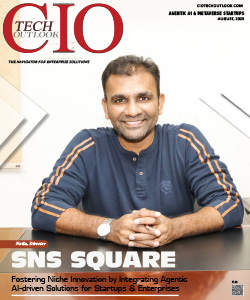How can data-sharing bring a positive impact on Industries
Janifha Evangeline | Friday, 13 May 2022, 16:31 IST

One can sell as well as purchase valuable information assets in highly efficient, cloud-based marketplaces, owing to the advances in data-sharing technologies. The advantage of combining this data with a new array of privacy-preserving technologies that include fully homomorphic encryption & differential privacy will help share encrypted data as well as perform computations on it without having to decrypt it first and this renders the best of all potential worlds such as sharing data while preserving security & privacy.
Therefore, the aforementioned merits have bolstered a promising new trend. Owing to regulatory or privacy concerns stores of sensitive data that are lying fallow in servers across the world are beginning to generate value across organizations in the form of new business models and opportunities. This data-sharing trend is picking up steam. Although data sharing is at present in an early stage, more than 70 percent of global data & analytics decision-makers are expanding their ability for using external data, according to a recent survey by Forrester Research.
Data sharing in healthcare
While the whole future of healthcare is going to mainly focus on the ability to share data securely, a system of trust which permits the efficient flow of personal healthcare information should be built, in order to empower patients as well as healthcare providers to take control of their healthcare journey.
With nearly ten thousand stores across the United States and proven success in annually administering flu and other vaccines, CVS Health - a pharmacy & retail giant was well-positioned to make a huge contribution to the historic COVID-19 vaccine rollout. However, when vaccines became widely available in the spring of 2021, the company needed analytics to understand when and where immunizations were required the most.
Karthik Kirubakaran, senior director of retail data engineering, CVS Health says “the organization’s data management processes and technology met the challenge: Because we had an effective data strategy in place, we were able to extend our capabilities and roll out a new system in weeks instead of months.”
Intending to forecast supply & demand, Kartik along with his team gathered external data from vaccine suppliers & the Centers for Disease Control and Prevention and then fed this information into internal systems which enabled partners to set up clinics, patients to schedule appointments, and analysts to measure campaign effectiveness. In addition, the team also shared data externally with research agencies as well as universities to help measure vaccination rates in the population.
Although all of this was carried out at an unprecedented pace during the pandemic, fortunately, CVSH’s data organization capabilities facilitated the company to make sense of incoming data, while data-sharing tools provided secure, near-real-time exchange. CVSH was in a position to move quickly by developing a data mesh across numerous platforms, rather than consolidating to a single technology.
Data sharing in the Automotive value chain industry
Over the last few years, data usage in the automotive industry has become highly important, globally and, OEMs have begun to investigate opportunities for sharing the data recently, although they have been collecting data from their connected vehicles for years. The reason why they are still hesitant about sharing data is because data privacy is seen as a high priority by the OEMs. Furthermore, the data leaks or issues will also result in negative impact on the trust, reliability & reputation.
The manufacturing practices of European automakers are fine-tuned and planned meticulously. However, owing to the dual crises of the pandemic, supply delays, and semiconductor shortages, the European automotive industry had to react quickly. But information across the whole automotive value chain from suppliers to customers to recyclers was limited. Therefore, many key suppliers, manufacturers as well as tech companies including BMW & Siemens, joined forces to plan a new way of working.
Catena-X - a data exchange ecosystem that enables organizations to share information on their terms, with security & privacy and security guaranteed, was launched by Twenty-eight partners. “We needed a collaboration platform to work with value chain partners, one that opened up a new playing field,” says Oliver Ganser, head of the Catena-X consortium.
Launched in August 2021, Catena-X is one of the 1st major use cases of the European Union’s federated and secure data-sharing standard. It is known as GALA-X. This decentralized approach consists of a multitude of separate platforms, all following a common EU standard. Enterprises using GALA-X can exchange data and collaborate across industries while retaining data sovereignty. “Instead of companies developing trust in each other individually, we can all trust our data to the GAIA-X framework,” says Ganser.
While GALA-X offered the standards needed, both small & large players made decisions to join Catena-X for addressing their supply chain issues.
Data sharing in the data encryption software industry
Encryption was implemented for ensuring the integrity and security of sensitive data against unauthorized users trying to access it while in transit as well as at rest between parties. The data recipient should have access to the keys for decrypting that data for processing it, though, encryption offers a reasonable amount of protection from outside interference in transit.
The Defense Advanced Research Projects Agency (DARPA) sponsored research that helped create everything from a personal computer, and internet to drones, GPS, etc. At present, while lowering privacy and security risk, DARPA is responding to the expansion of cloud computing as well as numerous other virtual networks by researching new methods for sharing data. Dr. Tom Rondeau, program manager at DARPA says that the key to democratic values is developing trust through privacy-preserving techniques
Led by Mr. Rondeau, the Data Protection in Virtual Environments program funds start-ups as well as incumbents to build hardware that can facilitate advanced encryption techniques. Standard encryption techniques keep data safe in transit and storage, however, it requires users to decrypt data for computational use that exposes it to cyber threats. In contrast, the agency is focused on facilitating fully homomorphic encryption, - this is a technique that keeps data protected even during the process of computation.
It could take days and days of computation time for implementing the FHE technique to sensitive data stores, until now. But data can be captured as well as stored securely on all consumer devices, with only encrypted data sent elsewhere for analysis.
This can be achieved once the privacy-preserving tech is available and embedded into phones & tablets. The agency wants to reduce that time slowly by building specialized chips & coprocessors.
“If we can accelerate FHE execution, the technique can become a fundamental part of our data-processing approach to almost every application,” says Rondeau.
DPRIVE provides a key use case that helps in sharing data securely on national security threats with other governments. “FHE could become a way of sharing intelligence data from the field while protecting our sources and techniques for gathering intelligence,” adds Rondeau.
The way ahead
Although advanced data-sharing technologies & privacy-sharing computing are already enabling enterprises positioned at the advance guard of this trend to take more value from data, they are not a solution for all data management requirements & challenges. They will continue to need strong data governance, and tagging & metadata are still necessary.


.jpg)

